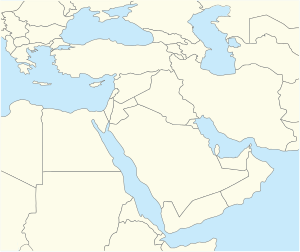Meleager of Gadara
Meleager of Gadara (Greek: Μελέαγρος ὁ Γαδαρεύς; fl. 1st century BC) was a poet and collector of epigrams. He wrote some satirical prose, now lost, and he wrote some sensual poetry, of which 134 epigrams survive. He also compiled numerous epigrams from diverse poets in an anthology known as the Garland, and although this does not survive, it is the original basis for the Greek Anthology.
Life
He was the son of Eucrates, born in the city of Gadara, now Umm Qais in Jordan, which was then a partially Hellenized community that was noted for its "remarkable contribution to Greek culture".[1] He was educated in Tyre and spent his later life in Cos where he died at an advanced age (est. 70 years old). According to short autobiographical poems he wrote, Meleager was proud of his hometown and identified himself as cosmopolitan, being both "Attic" (i.e. Hellenistic) and Syrian, and also praised Tyre for having "made [him] a man" and Kos for taking "care of [him] in [his] old age".[2]
The scholiast to the Palatine manuscript of the Greek Anthology says he flourished in the reign of Seleucus VI Epiphanes (95 – 93 BC). The uppermost date of his compilation of the Anthology is 60 BC, as it did not include Philodemus of Gadara, though later editors added thirty-four epigrams.
Some writers classed him among the Cynics,[3] and according to historian Benjamin Isaac Meleager's belief that "all men are equal and compatriots" strengthens this view, as some Cynics already held such a world view possibly as early as the 5th century BC.[4] Like his compatriot Menippus, Meleager wrote what were known as spoudogeloia (Greek singular: σπουδογέλοιος), satirical prose essays putting philosophy in popular form with humorous illustrations. These are completely lost. Meleager's fame is securely founded on the one hundred and thirty-four epigrams of his own which he included in his Anthology. The manuscripts of the Greek Anthology are the sole source of these epigrams.[5]
The Garland of Meleager
Meleager is famous for his anthology of poetry entitled The Garland (Greek: Στέφανος). Polemon of Ilium and others had created collections of monumental inscriptions, or of poems on particular subjects earlier, but Meleager first did so comprehensively. He collected epigrams by forty-six Greek poets, from every lyric period up to his own. His title referred to the commonplace comparison of small beautiful poems to flowers, and in the introduction to his work, he attached the names of various flowers, shrubs, and herbs — as emblems — to the names of the several poets. [6] The Garland itself has survived only as one of the original constituent roots to the Anthologia Graeca.
Poetry
Meleager's poetry is concerned with personal experience and emotions, frequently with love and its discontents. He typically describes himself not as an active and engaged lover, but as one struck by the beauty of a woman or boy. The following is an example:[7]
- At 12 o'clock in the afternoon
- In the middle of the street –
- Alexis!
- In the middle of the street –
- Summer had all but brought the fruit
- To its perilous end:
- And the summer sun and that boy's look
- To its perilous end:
- Did their work on me!
References
- Isaac 2017, p. 127, 156.
- Isaac 2017, pp. 156, 157.
- Athenaeus, Deipnosophists iv. 157. See also Diogenes Laërtius, vi. 99, who classes Meleager with Menippus.
- Isaac 2017, p. 156.
- Select Epigrams from the Greek Anthology J.W. Mackail, editor. Longmans, Green & Co., 1890
- Smith, Philip (1867). "Planudes". In William Smith (ed.). Dictionary of Greek and Roman Biography and Mythology. 3. Boston: Little, Brown and Company. p. 385.
- Greek Anthology, xii. 127, from Peter Jay, (1974), The Greek Anthology and Other Ancient Greek Epigrams, page 142.
Bibliography
- Isaac, Benjamin (2017). Empire and Ideology in the Graeco-Roman World. Cambridge: Cambridge University Press. ISBN 978-1-107-13589-5. Retrieved 3 June 2020.CS1 maint: ref=harv (link)
Further reading
- The Greek Anthology: Hellenistic Epigrams Edited by A.S.F. Gow and D.L. Page (2 vols., 1965 Cambridge U.P.) (Ancient Greek text, English translations, detailed commentary)
- Meleager, The Poems of Meleager Tr. Peter Wigham, Peter Jay. (1975. Anvil Press) ISBN 0-85646-000-1
- Meleager, Meleager: The Poems Tr. Jerry Clack (1992. Bolchazy-Carducci) ISBN 978-0-86516-254-9
External links
- Meleager of Gadara: translation of all surviving epigrams at attalus.org; adapted from W.R.Paton (1916-18)
